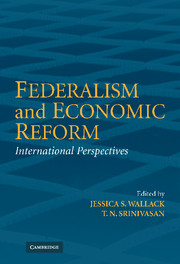Book contents
- Frontmatter
- Contents
- List of Contributors
- Acknowledgments
- 1 Analyzing Federalism: Stylized Models and the Political Economy Reality
- 2 Federalism in Argentina and the Reforms of the 1990s
- 3 Australia: Central Fiscal Dominance, Collaborative Federalism, and Economic Reform
- 4 The Brazilian Federation: Facts, Challenges, and Perspectives
- 5 Changing with the Times: Success, Failure, and Inertia in Canadian Federal Arrangements, 1945–2002
- 6 Fiscal Federalism and Economic Reform in China
- 7 Indian Federalism, Economic Reform, and Globalization
- 8 Mexico's Decentralization at a Crossroads
- 9 Transfer Dependence and Regional Disparities in Nigerian Federalism
- 10 Conclusions and Lessons for Further Study
- Index
- References
1 - Analyzing Federalism: Stylized Models and the Political Economy Reality
Published online by Cambridge University Press: 25 July 2009
- Frontmatter
- Contents
- List of Contributors
- Acknowledgments
- 1 Analyzing Federalism: Stylized Models and the Political Economy Reality
- 2 Federalism in Argentina and the Reforms of the 1990s
- 3 Australia: Central Fiscal Dominance, Collaborative Federalism, and Economic Reform
- 4 The Brazilian Federation: Facts, Challenges, and Perspectives
- 5 Changing with the Times: Success, Failure, and Inertia in Canadian Federal Arrangements, 1945–2002
- 6 Fiscal Federalism and Economic Reform in China
- 7 Indian Federalism, Economic Reform, and Globalization
- 8 Mexico's Decentralization at a Crossroads
- 9 Transfer Dependence and Regional Disparities in Nigerian Federalism
- 10 Conclusions and Lessons for Further Study
- Index
- References
Summary
INTRODUCTION
How does federalism affect policymaking? How do the details of the division of policy authority as well as expenditure and revenue powers across levels of government affect prospects for efficient and responsive governance? How does the economic, social, and political context – especially the recent wave of globalization and domestic economic liberalization – affect the workings of any given federal arrangements?
These questions have given rise to a large and varied positive literature on the actual workings of federalism as well as a significant normative literature full of suggestions for how federations should allocate fiscal and other decision-making authority across several levels of government. The literature ranges from stylized models of the costs and benefits of different ways of allocating fiscal authority among social planners in closed economies to detailed research on the nuances of interactions among levels of government in particular countries, time periods, and policy areas.
On one end of the spectrum of research on federalism, national and subnational governments are assumed to act as benevolent social planners who are omniscient and omnipotent, with national planners capable of addressing any externalities from subnational social planners' actions that spill over from one region to another. Social planners at all levels are assumed to have all the relevant information and capacity for enforcement of their decisions. Opportunistic behavior is assumed to be nonexistent. Evaluating fiscal federalism in a closed-economy setting is another common simplification used to keep models tractable and implications for federal design and function clear.
- Type
- Chapter
- Information
- Federalism and Economic ReformInternational Perspectives, pp. 1 - 24Publisher: Cambridge University PressPrint publication year: 2006



